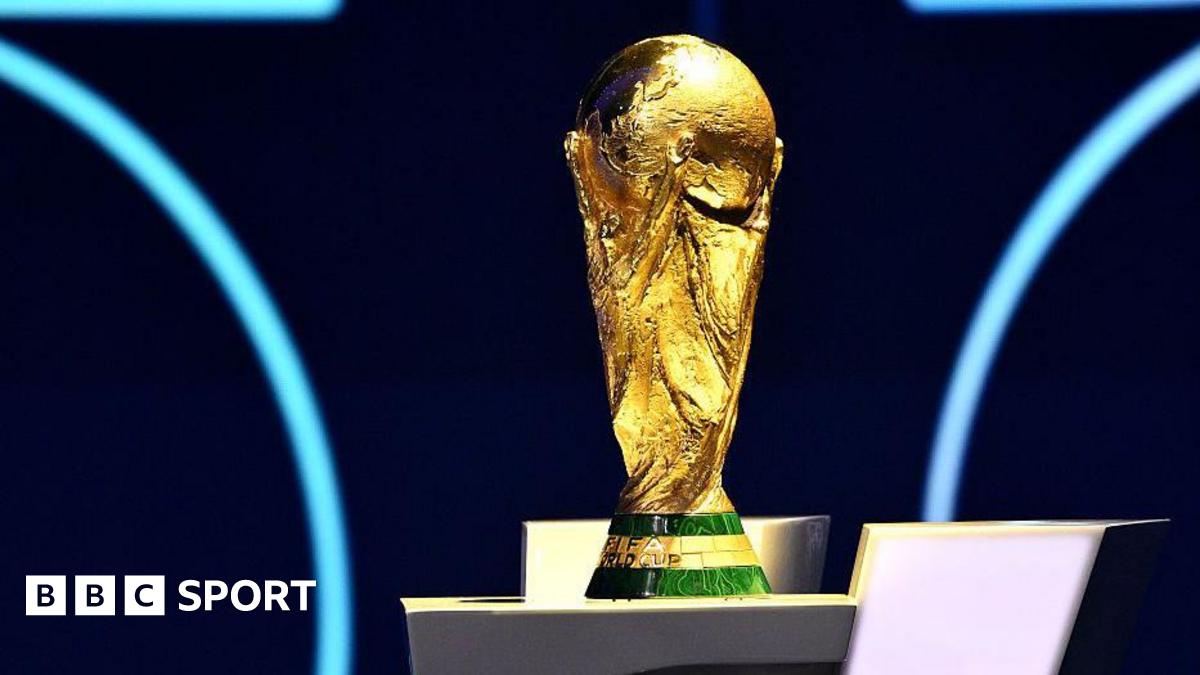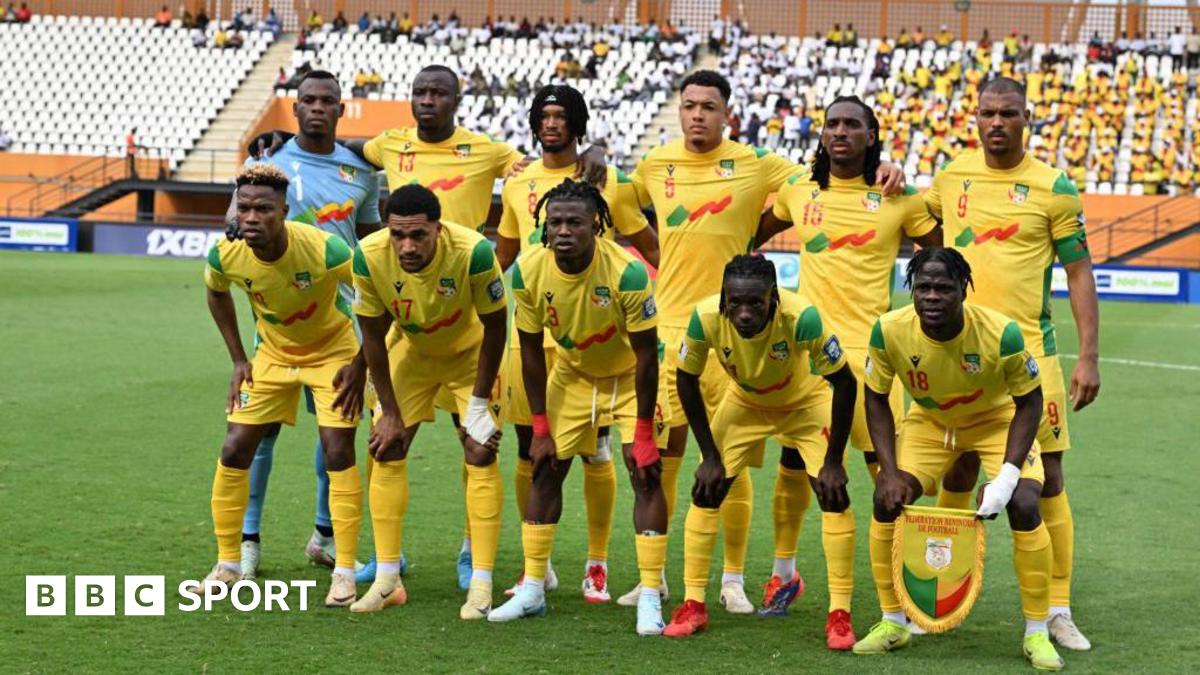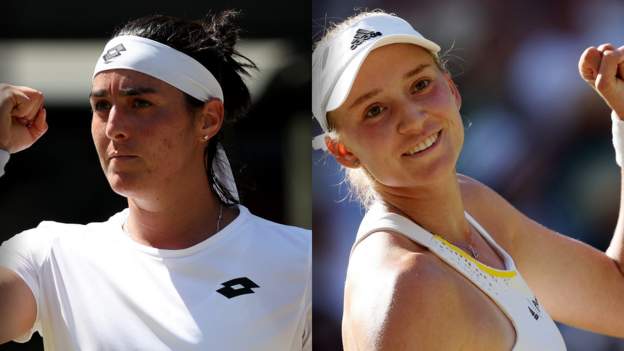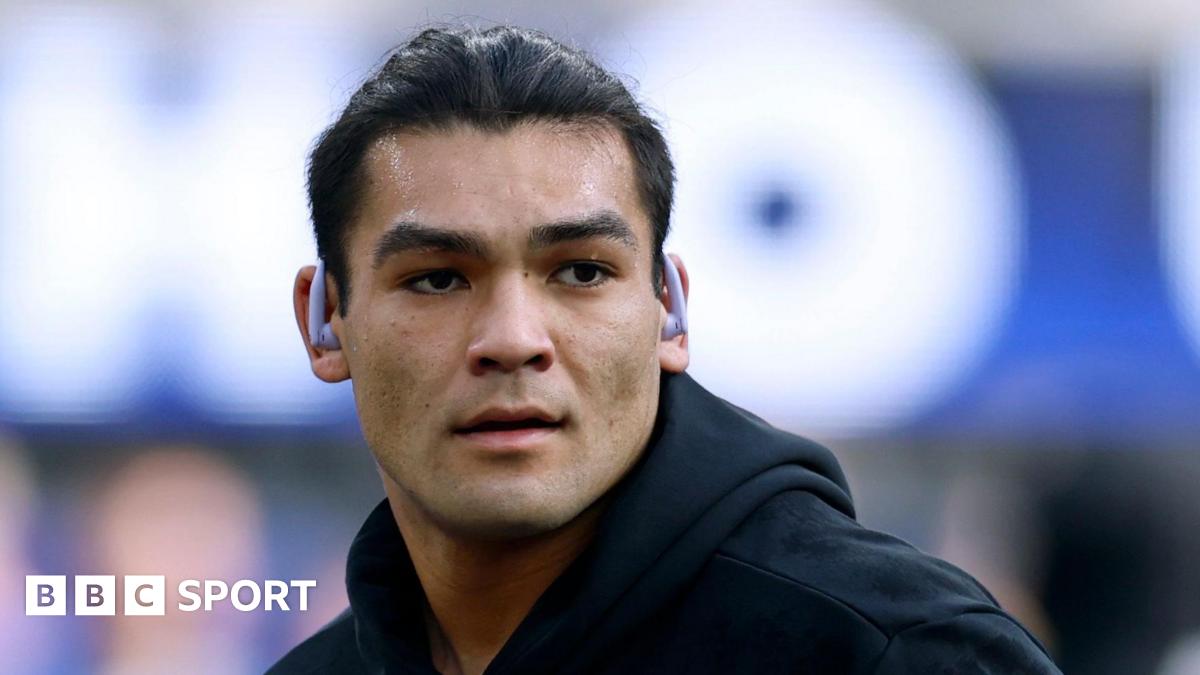| Venue: All England Club Dates: 27 June-10 July |
| Coverage: Live across BBC TV, radio and online with extensive coverage on BBC iPlayer, Red Button, Connected TVs and mobile app. |
History makers Ons Jabeur and Elena Rybakina will meet in the Wimbledon final after the pair claimed impressive victories in the last four.
Tunisian third seed Jabeur became the first Arab player to reach a Grand Slam singles final with a 6-2 3-6 6-1 win over Tatjana Maria.
Rybakina then became the first singles player from Kazakhstan to reach a major final with a 6-3 6-3 dismantling of former champion Simona Halep.
The two will meet on Saturday.
Jabeur has become a favourite at Wimbledon, and she and good friend Maria thrilled the crowd, before sharing a long and loving embrace at the net as Jabeur secured victory.
Maria gave birth to her second child Cecilia only last year, and has defied the odds in a remarkable run to the Wimbledon semi-finals.
Ranked second in the world, Jabeur is the first African woman to reach a major final since South Africa’s Sandra Reynolds at Wimbledon in 1960.
“It is a dream come true after years and years of work and sacrifice,” said Jabeur.
“I’m really happy it is paying off and now there is one more match to come.”
She and world number 23 Rybakina, who is the fourth-lowest ranked player to reach the Wimbledon final since 1984, will meet on Centre Court in a match-up of two first-time Grand Slam finalists.
While Rybakina’s progression has gone under the radar, she outmuscled former world number one Halep with relative ease.
“I think it’s going to be a great match [against Ons Jabeur]; she’s a great player, very tricky player – it’s not going to be easy to play against her drop shots and volleys,” Rybakina said.
“I think it will be a great match – I think I already did the work so it’s time to enjoy it out on court.”
Born in Russia, she has represented Kazakhstan since 2018 after they offered her more financial support and will now bid to become the country’s first player to win a major singles trophy.
Russian players were banned by Wimbledon from competing this year after the country’s invasion of Ukraine.
Asked about her Russian background, the Moscow-born player said: “I’ve been playing for Kazakhstan for a long time. I’m really happy representing Kazakhstan. They believed in me.
“There is no more question about how I feel.”
‘Minister of Happiness’ Jabeur bests ‘BBQ buddy’
Jabeur’s story is one of an inspirational late bloomer who lacked patience in her younger days before finding the right mentality to complement her talent.
That has enabled her to win WTA tournaments, rise up the rankings and regularly break down barriers.
Known as the ‘Minister of Happiness’ in her country, Jabeur is a popular figure in Tunisia, the Arab world and Africa as she continues to be a trailblazer.
“I’m a proud Tunisian woman here today and I know in Tunisia they are going crazy right now,” she said.
“I try to inspire as much as I can and I want to see more Arab and African players on the tour.”
On the basis of their rankings, Jabeur was the overwhelming favourite against Maria – and that eventually was borne out in a compelling contest.
Both players have a similar style, keen to use their slice and play with variety, and it made for an entertaining match.
After an edgy start by both players, Jabeur’s extra quality shone through in the first set.
Immediately Maria’s serve came under pressure in an eight-minute opening game, the German eventually holding after seeing off two break points.
However, she was unable to withstand more pressure in her next service game and Jabeur moved into a lead she would not relinquish in the opening set.
The third seed appeared to be cruising towards a routine win when she earned two more break points in the second game of the second set.
But Maria saved those and it sparked a switch of momentum.
Perhaps it should not have been surprising, considering Maria had fought back from a set down in three of her previous five matches – including her quarter-final win over fellow German Jule Niemeier.
Maria decisively broke in the fourth game and, after failing to break again for the set in the eighth, served it out to the delight of the 15,000 fans who were desperate for the action to be prolonged.
Ominously for Maria, Jabeur’s level returned at the start of the decider.
Jabeur broke for a 2-0 lead with a forehand passing winner, and from there she coasted to a victory which she said would leave her fellow Tunisians “celebrating like crazy” back home.
“On the court we knew both that we will go out and do our best, and after we knew that we still were going to be friends,” Maria said.
“She’s an amazing person. I’m really happy for her and I hope she can win it.”
Rybakina stuns Halep
At 23, Rybakina is the youngest Wimbledon finalist since Garbine Muguruza, then 21, achieved the feat in 2015 and she played with an ease that seemed beyond Halep.
As the only player left with any Grand Slam final experience, Halep was the heavy favourite at a venue where she has won 12 straight matches.
However, she was overpowered from the off by Rybakina, who used her big serve and equally giant groundstrokes to wrongfoot Halep.
The Romanian faced at least one break point in each of her first five service games, let down by a first-serve rate of 53% and nine double faults.
Rybakina showed no sign of nerves, bringing up three set points in the first with an 118mph ace, before converting on a long Halep forehand.
Her momentum continued in the second set, with Halep saving a break point in her first service game before coughing up back-to-back double faults to leave her in serious trouble.
Halep managed to get the break back and did it to love, stringing together three points for the first time in the match, but another double fault in the next game handed the lead back to Rybakina.
From then, Halep’s shoulders dropped, and Rybakina needed no further encouragement, again racing through her service games to put Halep under pressure.
The frustration was evident when Halep, serving to stay in the match at 5-3, went from 40-15 up to deuce on yet another double fault. She stood for a long time, leaning on her racquet, hand on her thigh as the crowd attempted to urge her on.
However, a wonderful return of serve from Rybakina caught the line to stun both Halep and the crowd.
“She deserved to win today with the way I played,” Halep said. “Somehow I think I gave her the perfect ball to do her game.”




















